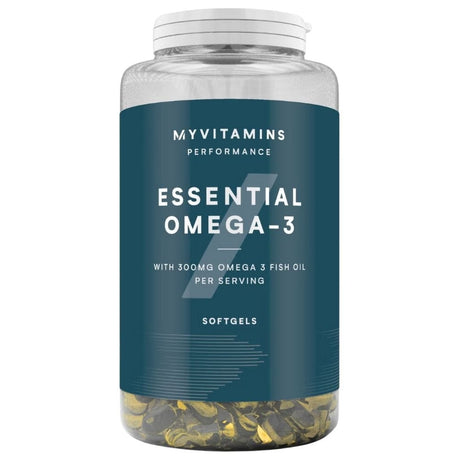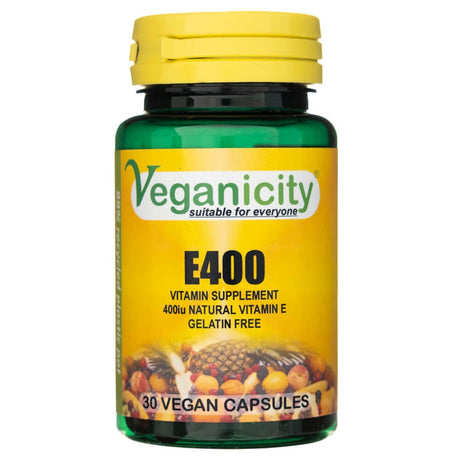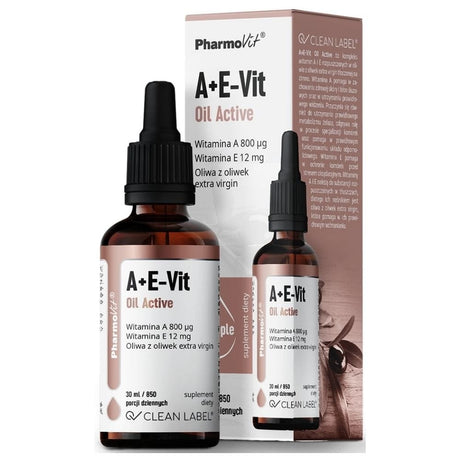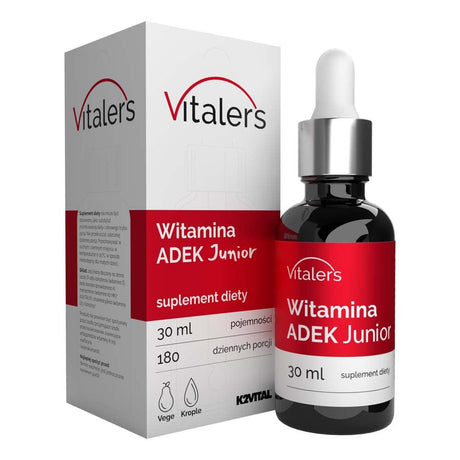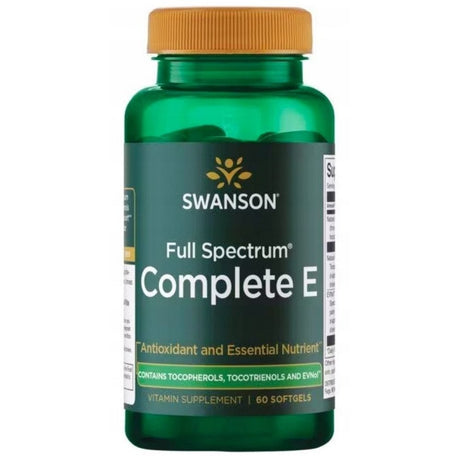Biowen
Ordinarie pris 150.39 krPris per enhet1.67 kr /itemEj tillgängligSwanson
Swanson Vitamin E 1000 IE - 250 kapslar
Ordinarie pris 603.99 krPris per enhet2.42 kr /itemEj tillgängligNow Foods
Now Foods Vitamin E-Oil, droppar - 30 ml
Ordinarie pris 163.99 krPris per enhet546.63 kr /100mlEj tillgängligPharmovit
Pharmovit K2 + D3-Vit 4000 IU Oil Active - 30 ml
Försäljningspris 133.27 kr Ordinarie pris 148.09 krPris per enhet444.23 kr /100mlEj tillgängligActivlab
Activlab DODA D'eau Mega Skin - 60 kapslar
Ordinarie pris 157.29 krPris per enhet2.62 kr /itemEj tillgängligVitaler's
Vitaler's Vitamin E 12 mg, droppar - 30 ml
Ordinarie pris 60.39 krPris per enhet20.13 kr /10mlEj tillgängligPharmovit
Pharmovit Omega-3 Max 1000 mg - 60 kapslar
Försäljningspris 137.41 kr Ordinarie pris 152.69 krPris per enhet2.29 kr /itemEj tillgängligLife Extension
Life Extension Super Vitamin E 268 mg - 90 Softgels
Försäljningspris 262.41 kr Ordinarie pris 308.79 krPris per enhet2.92 kr /itemEj tillgängligVitaler's
Vitaler's Vitamin ADEK, droppar - 30 ml
Ordinarie pris 125.39 krPris per enhet41.80 kr /10mlEj tillgängligAliness
Avitale Vitamin K2 med D3 Forte – 30 ml
Ordinarie pris 161.79 krPris per enhet539.30 kr /100mlEj tillgängligAliness
Avitale Vitamin K2 med D3 – 30 ml
Ordinarie pris 120.79 krPris per enhet402.63 kr /100mlEj tillgängligNow Foods
Now Foods Vitamin E-400 + Selen 100 mcg - 100 kapslar
Ordinarie pris 222.19 krPris per enhet2.22 kr /itemEj tillgängligPharmovit
Pharmovit K2-Vit Oil Active 75 mcg - 30 ml
Försäljningspris 114.82 kr Ordinarie pris 127.59 krPris per enhet382.73 kr /100mlEj tillgängligMyprotein
MyVita mins Essential Omega-3 – 90 kapslar
Ordinarie pris 94.59 krPris per enhet1.05 kr /itemEj tillgängligVeganicity
Veganicity Vitamin E400 - 30 kapslar
Ordinarie pris 114.99 krPris per enhet3.83 kr /itemEj tillgängligSolgar
Solgar Vitamin E 268 mg (400 IU) (d-Alfa-tokoferol) - 100 Softgels
Ordinarie pris 227.89 krPris per enhet2.28 kr /itemEj tillgängligNow Foods
Now Foods Gamma E Complex – 120 kapslar
Ordinarie pris 311.09 krPris per enhet5.18 kr /itemEj tillgängligDoctor's Best
Doctor's Best Vitamin E Tocotrienols 50 mg - 60 kapslar
Ordinarie pris 289.49 krPris per enhet4.82 kr /itemEj tillgängligPharmovit
Pharmovit A+E-Vit Oil Active - 30 ml
Försäljningspris 97.45 kr Ordinarie pris 108.29 krPris per enhet324.83 kr /100mlEj tillgängligVitaler's
Vitaler's Vitamin ADEK Junior, droppar - 30 ml
Ordinarie pris 109.39 krPris per enhet36.46 kr /10mlEj tillgängligAliness
Avitale Tokotrienole Full Spectrum, Naturligt vitamin E – 30 ml
Ordinarie pris 227.89 krPris per enhet759.63 kr /100mlEj tillgängligAliness
Avitale Vitamin A+E QualiE - 30 ml
Ordinarie pris 68.39 krPris per enhet227.97 kr /100mlEj tillgängligSwanson
Swanson Full Spectrum Complete E med tokotrienoler – 60 kapslar
Ordinarie pris 341.89 krPris per enhet5.70 kr /itemEj tillgängligLife Extension
Life Extension Superabsorberbara tokotrienoler - 60 kapslar
Ordinarie pris 289.49 krPris per enhet4.82 kr /itemEj tillgänglig
Vitamin E: Ungdomselixiret för övergripande hälsa och välbefinnande
Vitamin E, ofta kallat ungdomselixiret, är känt för sina kraftfulla antioxidantegenskaper. Detta viktiga näringsämne spelar en avgörande roll för att bevara integriteten hos celler, vävnader, och organ, och hjälper kroppen att upprätthålla homeostas genom olika biologiska processer. Många kliniska studier har bekräftat de mångfacetterade fördelarna med vitamin E för att upprätthålla den övergripande kroppsliga balansen. Låt oss utforska de viktigaste aspekterna av detta viktiga näringsämne.
Egenskaper och källor för vitamin E
Vitamin E är en samlingsbeteckning för en grupp kemiska föreningar med liknande fysiologiska aktiviteter. Det tillhör tokokromanolgruppen, som inkluderar tokoferoler (med alfa-tokoferol som den mest kritiska) och tokotrienoler.
Som en av de sällsynta fettlösliga vitaminerna, lagras inte vitamin E i betydande mängder i kroppen. Istället, finns det kvar under en relativt kort period, med 60% till 70% av föreningen som utsöndras dagligen. Denna snabba omsättning tyder på att kroppen strävar efter att upprätthålla en konstant och lämplig nivå baserat på dess aktuella behov.
Att upprätthålla en regelbunden tillförsel av vitamin E är avgörande, men det kan vara utmanande på grund av dess känslighet TiB för nedbrytning från syre och värme. Därför, är det bäst att söka E-vitamin i livsmedel som inte kräver värmebehandling. Rika källor till vitamin E inkluderar:
- Frön och nötter
- Vetegroddar
- Gröna bladgrönsaker (t.ex., spenat)
- Avokado
- Röd paprika
- Mango
- Vegetabiliska oljor (raps, solros, och olivolja)
- Fisk
- Hela spannmålskorn
E-vitaminets egenskaper och effekter på kroppen
E-vitamin är ett potent antioxidant som aktivt arbetar för att förhindra åldrandeprocessen. Den skyddar effektivt kroppen mot miljöeffekter, konserveringsmedel, och olika skadliga ämnen från maten. Några av dess viktigaste fördelar inkluderar:
- Stärker och ökar flexibiliteten i blodkärlen
- Stödjer behandlingen av muskelsjukdomar
- Skyddar mot cerebrovaskulära sjukdomar (t.ex., stroke, subaraknoidalblödning, aneurysm)
- Skyddar mot kardiovaskulära sjukdomar (t.ex., högt blodtryck, kranskärlssjukdom, hjärtsvikt)
- Positiv inverkan på hälsoproblem såsom ateroskleros, fibrotiska vävnadssjukdomar, amyotrofisk lateral skleros, och neurodegenerativa sjukdomar (Parkinsons, Alzheimers, AVED)
E-vitamin och fertilitet
E-vitamin spelar en avgörande roll för att upprätthålla normala funktioner i reproduktionsorganen hos kvinnor och är nödvändigt för befruktning och under graviditet. Hos män kan, långvarig brist leda till minskad gonadotropinsekretion, vilket resulterar i nedsatt libido, erektil dysfunktion, förändrad ejakulatvolym, spermiedegeneration, och infertilitet.
E-vitamin för hud och hår
E-vitaminets inverkan på hudens och hårets hälsa är betydande. Som en robust antioxidant, används det ofta som en primär ingrediens i anti-aging- och hudvårdsprodukter. För maximala fördelar, är det lämpligt att säkerställa ett tillräckligt internt E-vitaminintag vid sidan av topisk applicering. Fördelarna inkluderar:
- Förbättrad struktur, jämnhet, och elasticitet i både epidermis och dermis
- Näring, skydd, och regenerering av huden
- Minskad inflammation och svullnad
- Förbättrad läkning av missfärgningar och ärr
- Förbättrat allmänt tillstånd i hårbotten och hår
Vitamin E-brist: Orsaker och symtom
Upptaget av E-vitamin beror på olika faktorer utöver kosten. Brist kan uppstå på grund av otillräcklig gallproduktion eller som en följd av vissa sjukdomar (inklusive kolestas, celiaki, fettmalabsorption, och dysfunktioner i matsmältningssystemet). Vanliga symtom på E-vitaminbrist inkluderar:
- Kronisk svaghet
- Nedsatt immunförsvar (Återkommande infektioner)
- Muskel- och ledvärk
- Skörhet i blodkärlsväggar
- Brist på energi och apati
- Hudförändringar (keratos, torrhet)
Långvariglångvarig brist kan leda till allvarliga neurologiska störningar och degenerativa processer i hjärnan, som förvärras med åldern. Att uppfylla det dagliga behovet av vitamin E kan avsevärt förbättra kroppsfunktionerna, minska sjukdomsriskerna, och stödja läkningsprocesser för olika tillstånd.
Med tanke på dess omfattande fördelar och avgörande roll för att upprätthålla den allmänna hälsan, bör ett tillräckligt intag av vitamin E vara en prioritet i allas näringsplan. Oavsett om det sker genom en balanserad kost rik på E-vitaminkällor eller lämpliga tillskott, kan detta ungdomselixir bidra avsevärt till din hälsa och livslängd.













